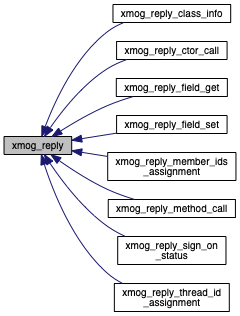|
| enum | Disposition { SUCCESS = 1,
TIMEOUT,
COMM_FAILURE
} |
| | The Disposition indicates whether the requested operation was even carried out. If not SUCCESS, the operation was not executed for the indicated reason. If SUCCESS, the rest of the reply's data indicates the actual result of the operation.
|
| |
| enum | { INIT_BLOCK_SIZE = 4096
} |
| |
|
| static xmog_reply * | decode (ACE_Message_Block *b) |
| | Factory function that decodes an incoming reply and creates a xmog_reply-descended reply object. More...
|
| |
◆ xmog_reply()
Constructor, specifying the reply type and the associated ACE_Message_Block, if there is one.
- Parameters
-
| b | ACE_Message_Block pointer with any data associated with the reply. The block's rd_ptr should be pointing to the reply data. Upon return, the xmog_reply owns the block and the caller must no longer refer to it. |
◆ decode()
| static xmog_reply* xmog_reply::decode |
( |
ACE_Message_Block * |
b | ) |
|
|
static |
Factory function that decodes an incoming reply and creates a xmog_reply-descended reply object.
- Parameters
-
| b | Pointer to an ACE_Message_Block containing the raw reply data. The block's rd_ptr is expected to point to the byte following the message's length field. The block's wr_ptr is expected to reflect the end of the reply's data. The created xmog_reply object will control b. |
- Return values
-
| Pointer | to an xmog_reply object; 0 if an error occurs. If an error occurs, the caller retains control of
- b. Upon success, the caller must no longer refer to
- b.
|
◆ read_data_code()
| int xmog_reply::read_data_code |
( |
xmog::xmog_data_code & |
code | ) |
|
|
protected |
Reads a data code.
- Parameters
-
◆ readClassName()
| int xmog_reply::readClassName |
( |
char ** |
str | ) |
|
|
protected |
Reads a UTF string from the message.
- Parameters
-
| str | receives the classname in UTF encoding.
|
◆ readData()
Reads a data object from the message.
- Parameters
-
| data | the utility object that will hold that data. |
◆ readDataProxy()
Reads a data proxy object from the message.
- Parameters
-
| data | the utility object that will hold that data. |
◆ readExc()
Reads an exception from the message.
- Parameters
-
| data | the utility object that will hold that data. |
◆ readInt()
| int xmog_reply::readInt |
( |
jint & |
i | ) |
|
|
protected |
Reads a 32bit integer from the message.
This method converts the number from network to host order.
◆ readLong()
| int xmog_reply::readLong |
( |
jlong & |
l | ) |
|
|
protected |
Reads a 64-bit integer from the message.
This method converts the number from network to host order.
◆ readLongUTF()
| int xmog_reply::readLongUTF |
( |
char ** |
str, |
|
|
jint * |
len = NULL |
|
) |
| |
|
protected |
Reads a long UTF string from the message.
- Parameters
-
| str | receives the string in UTF encoding. In many cases, developers can directly use this method, which is much faster than the corresponding readString() methods because no conversion has to be performed. |
| len | an optional pointer to hold the number of bytes that were read. |
◆ readShort()
| int xmog_reply::readShort |
( |
jshort & |
s | ) |
|
|
protected |
Reads a 16bit integer from the message.
This method converts the number from network to host order.
◆ readUTF()
| int xmog_reply::readUTF |
( |
char ** |
str, |
|
|
jint * |
len = NULL |
|
) |
| |
|
protected |
Reads a UTF string from the message.
- Parameters
-
| str | receives the string in UTF encoding. In many cases, developers can directly use this method, which is much faster than the corresponding readString() methods because no conversion has to be performed. |
| len | an optional pointer to hold the number of bytes that were read. |
The documentation for this class was generated from the following file:
